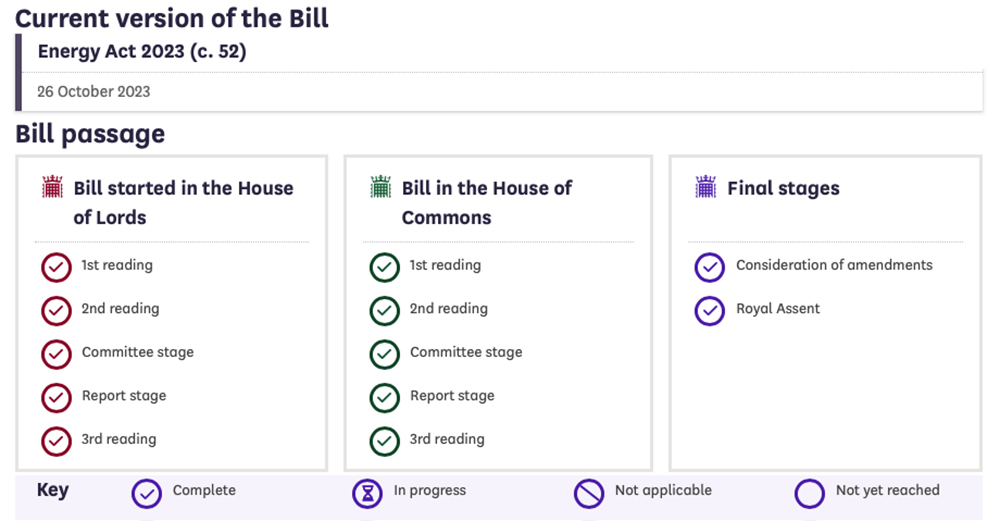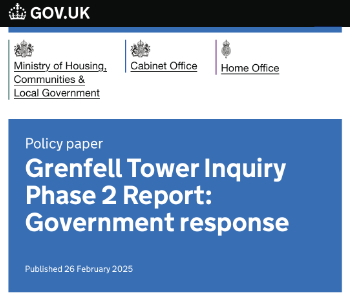Ofgem welcomes Energy Act getting Royal Assent
Contents |
[edit] Energy Act 2023
As described within the bill:
"Energy Act 2023. A bill to make provision about energy production and security and the regulation of the energy market, including provision about the licensing of carbon dioxide transport and storage; about commercial arrangements for carbon capture and storage and for hydrogen production and transportation; about new technology, including low-carbon heat schemes and hydrogen grid trials; about the Independent System Operator and Planner; about gas and electricity industry codes; about financial support for persons carrying on energy-intensive activities; about heat networks; about energy smart appliances and load control; about the energy performance of premises; about energy savings opportunity schemes; about the resilience of the core fuel sector; about offshore energy production, including environmental protection, licensing and decommissioning; about the civil nuclear sector, including the Civil Nuclear Constabulary and pensions; and for connected purposes."
Source https://www.parallelparliament.co.uk/bills/2022-23/energy
[edit] Ofgem and the Energy Act
Ofgem has welcomed getting a statutory net zero duty after the groundbreaking Energy Act became law on October 26, 2023. The duty restates Ofgem’s principal objective to protect the interests of existing and future energy consumers. But it adds a specific mandate to achieve it by supporting the Government meet its legal obligation to get to net zero by 2050.
It underlines consumers are best protected by building a low-carbon, low-cost energy system, limiting exposure to volatile gas markets and ending dependence on fossil fuels.
The Act overall gives Ofgem new powers to protect consumers and reach net zero – by unlocking investment, accelerating planning decisions, building new infrastructure and paving the way for innovation and technology.
[edit] New powers and responsibilities for Ofgem
The major new powers and responsibilities for Ofgem include:
- Net zero duty: amending the regulator’s existing duties by including reference to the net zero targets and five-year carbon budgets in the Climate Change Act 2008. This requires Ofgem to consider how its decisions may assist the Secretary of State in meeting the government’s net zero target, while protecting the interests of existing and future consumers. Ofgem welcomed the Government decision in June 2023 to include the duty in the Act
- New system operator: establish a Future System Operator and Independent System Operator – with responsibilities in both the electricity and gas systems, ensuring efficient energy planning, enhancing energy security, minimising cost to consumers and promoting innovation. The Bill imposes a duty on the Future System Operator to respond to requests for advice, analysis or information from government or Ofgem
- Heat networks: appointing Ofgem as the new regulator for heat networks in Great Britain
- Energy codes: new governance framework for energy codes – this will move responsibility from industry committees to “code managers” directly accountable to Ofgem. This will give Ofgem strategic powers to protect consumers and create competition
- Hydrogen transport and storage: establishing new business models for hydrogen transport and storage to remove market barriers, like high upfront costs, and unlock investment with long-term revenue stability.
- Multi-purpose interconnectors: introduce a new legal definition for multi-purpose interconnectors into the Electricity Act 1989.
- Energy intensive industry: give government powers to compensate energy intensive industries for a portion of their network charging costs – funded via a charge on all licenced electricity suppliers called the EII Support Levy
- CO2 transport and storage: establishing an economic regulation model with statutory objectives and legal powers for Ofgem as the economic regulator of CO2 transport and storage. This will unlock private finance and remove investment barriers for novel technology
[edit] Comment
Jonathan Brearley, Ofgem CEO, said:
“We welcome the Energy Act getting Royal Assent. It is the most significant energy legislation for a decade and a world-first in giving us a legal mandate targeting net zero. It gives Ofgem the powers to drive through the energy transition - unlocking investment, accelerating planning and building the infrastructure the economy needs. This will give us security from volatile world gas markets and end our dependency on fossil fuels."
“Consumers have faced a huge number of challenges in recent years, with high energy prices and cost-of-living pressures. The Act will give extra protection for existing and future customers, while powering the journey to net zero at the lowest possible cost to households and businesses. We’re now working closely with government, consumers and sector to implement the legislation in full."
This article was issued via Press Release as "Ofgem welcomes Energy Act getting Royal Assent" dated October 26, 2023.
[edit] Related articles on Designing Buildings
- Climate Change Act.
- Climate Change Levy.
- CRC Energy Efficiency Scheme.
- Energy act.
- Emission rates.
- Energy Performance Certificates.
- Energy Related Products Regulations.
- Energy storage.
- Energy targets.
- Environment Bill 2020.
- Environmental Protection Act.
- Green Deal.
- Sustainability.
- Sustainable development.
- The Carbon Plan: Delivering our low carbon future.
- Zero carbon homes.
- Zero carbon non-domestic buildings.
Featured articles and news
Sustainable Urban Drainage and Biodiversity
Awards for champions of these interconnected fields now open.
Microcosm of biodiversity in balconies and containers
How minor design adaptations for considerable biodiversity benefit.
CIOB student competitive construction challenge Ireland
Inspiring a new wave of Irish construction professionals.
Challenges of the net zero transition in Scotland
Skills shortage and ageing workforce hampering Scottish transition to net zero.
Private rental sector, living standards and fuel poverty
Report from the NRH in partnership with Impact on Urban Health.
.Cold chain condensing units market update
Tracking the evolution of commercial refrigeration unit markets.
Attending a conservation training course, personal account
The benefits of further learning for professsionals.
Restoring Alexander Pope's grotto
The only surviving part of his villa in Twickenham.
International Women's Day 8 March, 2025
Accelerating Action for For ALL Women and Girls: Rights. Equality. Empowerment.
Lack of construction careers advice threatens housing targets
CIOB warning on Government plans to accelerate housebuilding and development.
Shelter from the storm in Ukraine
Ukraine’s architects paving the path to recovery.
BSRIA market intelligence division key appointment
Lisa Wiltshire to lead rapidly growing Market Intelligence division.
A blueprint for construction’s sustainability efforts
Practical steps to achieve the United Nations Sustainable Development Goals.
Timber in Construction Roadmap
Ambitious plans from the Government to increase the use of timber in construction.
ECA digital series unveils road to net-zero.
Retrofit and Decarbonisation framework N9 launched
Aligned with LHCPG social value strategy and the Gold Standard.
Competence framework for sustainability
In the built environment launched by CIC and the Edge.
Institute of Roofing members welcomed into CIOB
IoR members transition to CIOB membership based on individual expertise and qualifications.
Join the Building Safety Linkedin group to stay up-to-date and join the debate.
Government responds to the final Grenfell Inquiry report
A with a brief summary with reactions to their response.




























